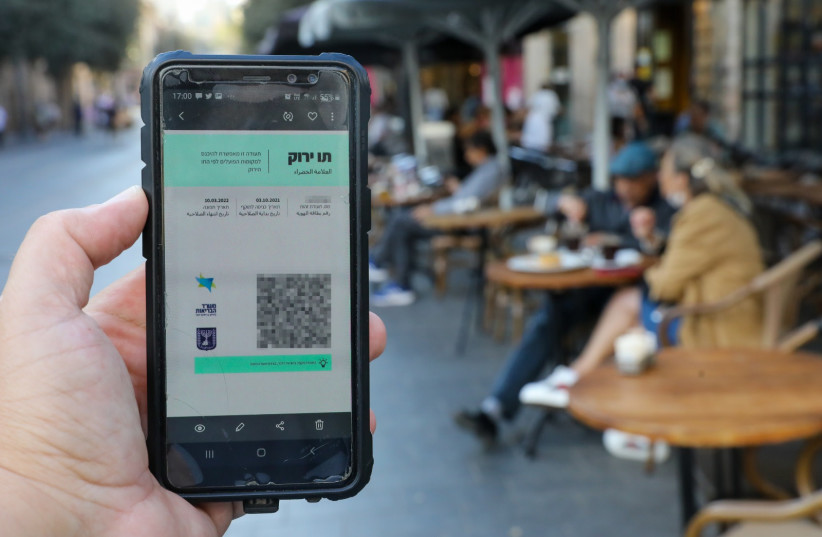Green Pass regulations, which were set to expire on February 1, have been extended an extra week, the government decided Sunday.
Regional Cooperation Minister Esawi Frej (Meretz), Education Minister Yifat Shasha-Biton (New Hope) and Justice Minister Gideon Sa’ar (New Hope) voted against the motion to extend the Green Pass.
Sa’ar had already said he intended to vote against the extension, saying there was no longer any understandable epidemiological purpose to keep it.
The extended regulations include restrictions on 50 people gathering in closed spaces outside of the Green Pass system and the extension of the Purple Ribbon regulations in commercial spaces until February 6.
Additionally, regulations will be extended until February 27 in educational institutions, requiring teachers to present a Green Pass upon arrival, and for students and teachers to wear masks inside classrooms.

Green Pass regulations applicable to employees of health and welfare institutions will be extended until March 1.
The downward trend in new daily cases toward the end of last week continued over the weekend. On Saturday, 49,371 new cases were recorded, and 53,000 new cases were recorded on Friday, the Health Ministry reported Sunday.
The numbers are usually lower over the weekend due to reduced testing and do not always accurately represent the situation. The consistent decline in the reproduction (R) rate, which currently stands at 0.95, indicates that the Omicron wave is ebbing, and not just for the weekend.
Last December 30, as the Omicron variant started to take hold in Israel, the R rate was 2.12.
Significantly fewer tests were taken on Saturday than were taken during the week, and there was a positive return rate of 27% for the 177,387 tests taken.
Serious cases continued to rise and are predicted to do so for a few more days. According to some estimates, they will approach 1,200 before beginning to decline. There were 1,086 serious cases on Saturday, 86 more than on Friday, the Health Ministry reported Sunday.
It was the second day in a row that there were more than 1,000 serious cases for the first time in almost a year. The last time there were more than 1,000 serious cases was last February, before the coronavirus vaccines were widely available.
Prime Minister Naftali Bennett on Sunday expressed cautious optimism about stabilization of the Omicron wave.
“We are seeing the beginning of a trend of stabilization in the Omicron wave,” he said at the cabinet meeting. “I intentionally choose these words to avoid the ‘end of semester’ atmosphere, and celebrating the end of Omicron is out of place. Right now, at this time we are dealing with congestion in the hospitals and a very high number of infected people.”
Regarding the new testing system being implemented in educational institutions, under which students are required to take antigen tests twice a week to prevent spread of the virus, Bennett said: “Parents should take responsibility, making sure to test their children properly and only send them to school if they feel well.”
“A few more weeks like this, if we all act responsibly, together we will overcome this wave as well,” he said.
Students took a total of 701,957 antigen tests on Sunday, and an estimated 3% of them returned a positive result, the Education Ministry reported Sunday.
The actual number of tests is expected to be higher as the report did not include tests that were not uploaded to the ministry’s portal.
